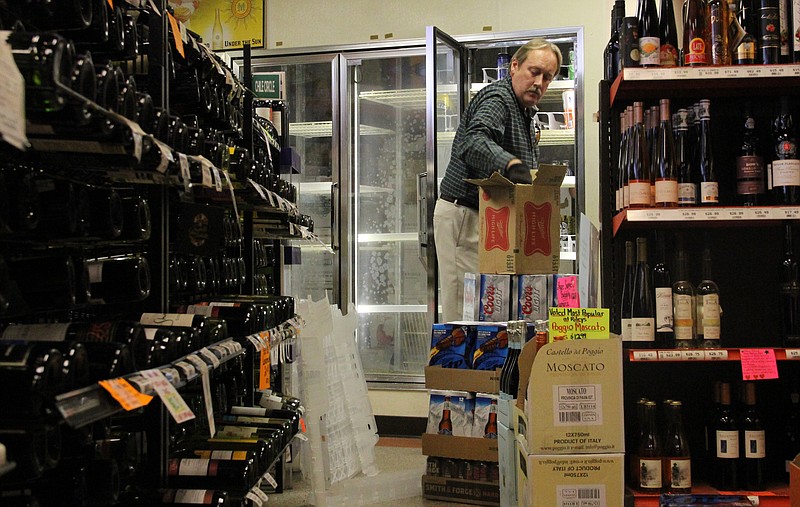NASHVILLE - The Tennessee House on Monday night approved legislation permitting Sunday wine and liquor bottle sales after a rollicking debate in which opponents invoked God, fretted about morality and abstinence and mourned the mounting decay in rural areas as well as accelerating losses of small businesses.
The vote for the bill, sponsored by Rep. Gerald McCormick, R-Chattanooga, was 55-35. It now goes to the Senate.
As passed, the piece of legislation authorizes grocery stores to sell wine on Sundays during set hours. It also allows package stores, which are usually owned by small operators, to open and sell wine and liquor on Sundays.
Various compromises approved would give the small liquor store operators a head start on Sunday sales, allowing them to open immediately should the measure pass the Senate and become law. Grocery stores, many of them chains, could begin selling on Jan. 1, 2019.
While the bill also would have allowed stores to sell wine and spirits on major federal and state holidays, McCormick accepted and supported an amendment by Rep. Tim Wirgau, R-Paris, that excludes Christmas, Easter and Thanksgiving.
McCormick said he brought the legislation as a follow-through on an historic law passed four years ago allowing grocery stores to sell wine. He said he's fielded numerous complaints from patrons blocked from purchasing bottles of wine.
The bill aligns hours and days when wine can be sold at grocery stores with the current laws permitting beer sales.
Rep. Andy Holt, R-Dresden, quoted from the Bible in opposing the measure.
"Remember the Sabbath day by keeping it holy," the rural West Tennessean said, later jabbing at bill supporters saying he would "be remiss" if he didn't point out that some proponents "in almost every context claim their Christian faith" but were voting for the bill.
Holt also fretted the bill would place more alcohol "in the hands of those more susceptible."
Later, Rep. Johnny Shaw, D-Bolivar, a minister, fired back at the religious overtones.
"I've heard more about righteousness ... than I've heard in 18 years in this Legislature," he said, adding that Old Testament injunctions were superseded by Jesus.
"We need to stop playing this game of righteousness," Shaw said. "I've seen legislation pass on this floor that hurt people a lot more than selling liquor on Sunday. Personally, because Jesus died for my sins, every day is holy."
He asked: "What's the difference between having a drink on Sunday and hating somebody Monday?"
Earlier, Rep. Jerry Sexton, R-Bean Station, a businessman and pastor, sought to limit Sunday sales to one hour. While that amendment failed, he urged colleagues "to consider moderation."
And he questioned what moral authority state government has in telling Tennesseans not to "smoke a joint of marijuana or even a snort of cocaine. We in this body do have a responsibility. Whether we like it or not, we're voting morals."
Wirgau fretted that the bill will accelerate the loss of small businesses across Tennessee and especially in rural areas.
"There goes another sale from a guy down the corner [grocery store] and there goes another business," he said, saying rural towns are already plagued by "empty storefronts."
McCormick moved to table most amendments, allowing critics to have their say. He agreed compromises had to be made in order to get liquor store owners to go along with the legislation. Nonetheless, he joined Wirgau on the amendment exempting sales on Christmas, Easter and Thanksgiving.
"The purpose again in bringing this bill is to give consumers who are our constituents and businesses the ability to make their own decisions regarding the purchase and sale of these products instead of the current system that has the government telling them what they can do and what they can't do," McCormick said.
Besides giving liquor stores a head start on Sunday sales once the bill becomes law and requiring grocery stores to wait until Jan. 1, 2019, the bill as amended would:
» Allow retail package stores and grocery stores to operate from 8 a.m. to 11 p.m. Monday through Saturday. Sunday sales would be from 10 a.m. to 11 p.m.
» No new liquor store licenses will be issued for three years in areas already allowing package sales. Store owners will be allowed to sell their licenses during that period. That was included to placate the smaller owners who fear being run out of business.
» Another provision allows the liquor store owners closing to hold "going out of business" sales. Now they have to sell their product back to wholesalers.
» Another provision requires stores to mark up their product 10 percent instead of the 20 percent markup that was in the original bill.
Contact Andy Sher at asher@timesfreepress.com or 615-255-0550.

